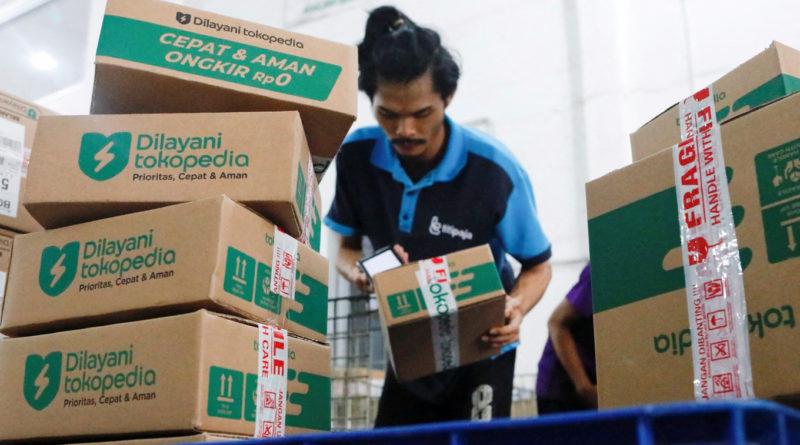BUSINESS-COMPANIES | Has ASEAN economic integration empowered regional champions?
An employee packs goods at GoTo’s e-commerce unit Tokopedia’s warehouse in Jakarta on Aug. 31, 2022. (Reuters/Ajeng Dinar Ulfiana)
.
With the global trade map being redrawn as companies look to diversify away from a reliance on single-source supply chains, cumulative ASEAN trade along major corridors is expected to grow by US$1.2 trillion in the next ten years.
.

I n 2015, ASEAN launched its ambitious ASEAN Economic Community, aiming to catalyze a golden age of free trade, freedom of movement of goods and people and integrated ASEAN opportunities.
Boston Consulting Group’s (BCG) 2012 and 2014 reports, The Companies Piloting a Soaring Region and Winning in ASEAN, highlighted the buoyant excitement of that period. Our cross-sector regional survey indicated 80 percent of companies viewed ASEAN integration as an opportunity for their businesses to accelerate economic growth in their industries. They envisioned growing to become regional champions – showcasing success in one or more regions, on the way to achieving the scale of multinational companies (MNCs).
The last decade of regional economic growth has provided an encouraging backdrop. ASEAN gross domestic product (GDP) reached US$3.6 trillion in 2022, a 50 percent increase from $2.4 trillion in 2013. Indonesia’s economy has witnessed substantial growth over this period, growing from $912.52 billion in 2013 to $1.32 trillion by 2022, and other Southeast Asian countries have witnessed even more rapid growth.
In recent years, however, transformational shifts have created complex challenges for regional companies. There have been major geopolitical and economic transitions because of conflict, the pandemic and cost-of-living challenges.
Gradually, the quest for regional dominance has been impacted by the twin forces of globalization, which has recalibrated supply chains, and the digital revolution, which has transformed brand promotion and sales channels. Lack of clarity presents another major challenge, particularly in fast-moving changes around carbon regulation and pricing.
A decade on from a bullish first assessment, we must ask if the concept of regional champions still resonates. And what are the prospects for ambitious companies to become the regional champions of the future? Examining current examples of regional champions provides useful insights.
Indonesia boasts a vibrant economy with increasing regional scope, and an energized start-up ecosystem.
GoTo, a merger between Indonesian players Gojek and Tokopedia, is a prominent example of this potential, evolving beyond ride-hailing and e-commerce foundations to embrace fintech opportunities that have enabled expansion across the region. While Indonesia remains its core market, this diversified approach provides early signs of an emerging regional champion.
Traveloka is another notable example. As Southeast Asia’s leading travel and lifestyle platform, Traveloka has successfully expanded its services beyond travel to include financial services such as Traveloka PayLater, which provides installment payment options. This diversification has strengthened its market position across the region.
eFishery, an Indonesian agritech start-up, offers another illustration. By leveraging technology to optimize fish farming, eFishery has not only improved productivity for local farmers, but also expanded its market to other Southeast Asian countries. Its innovative approach and regional growth signal its potential as a regional champion.
The reality is that in the past, regional champions were household names—billion-dollar companies with extensive legacies. Now, however, there is a modern business landscape that offers even the smallest enterprise to scale to build an effective regional footprint.
A bright future for regional champions
The future still appears bright for the region and its companies.
With the global trade map being redrawn as companies look to diversify away from a reliance on single-source supply chains, cumulative ASEAN trade along major corridors is expected to grow by $1.2 trillion in the next ten years.
The Comprehensive and Progressive Agreement for Trans-Pacific Partnership (CPTPP) is due to unlock new economic opportunities. At the same time, Southeast Asia’s domestic consumption is forecast to double to $4 trillion by 2031.
Local labor pools are deep, with large and increasingly educated workforces. Significant investments in technology and climate tech have also fostered a vibrant innovation ecosystem. What is more, the local political landscape, while complex, provides continuity which can offer valuable reassurance for businesses.
This creates fertile ground to grow the next regional champions, yet companies must navigate a complex landscape with an agile mindset to deliver.
Employing a multi-local strategy is critical. This means delivering a regional footprint which can be customized to the unique local context of this culturally and economically diverse region. BCG suggests exploring fractal companies, local companies that address the differentiated needs of customers in a local arena with speed, responsiveness and innovation.
Understanding and navigating local regulation and government policy is also an important element. Companies need to work to align with local regulators while maintaining the flexibility to adapt to changing requirements, as well as visionary skills to help guide these evolutions.
At the same time, governments should work to create a conducive and business-friendly ecosystem that recognizes the needs and challenges of the modern landscape. The Indonesian government has been actively supporting local champions through various initiatives. For example, the Indonesia Investment Authority (INA) was established to boost infrastructure development and attract foreign investment, creating opportunities for local businesses to grow and compete regionally. Additionally, focus on digital infrastructure and regulatory reforms aims to create a more favorable environment for start-ups and small and medium enterprises (SMEs).
Leveraging new technologies, including deepening digitalization and evolving artificial intelligence (AI) solutions, will also be vital, and offers a key platform to that kind of rapidly scaled growth. This complements the wider need for agility, as technology tools provide a platform to pivot and adapt to a wide range of challenges. Progress on ASEAN’s Digital Economic Framework Agreement (DEFA) will offer an important catalyst for this journey.
There are also new paradigms informing success. Social and ethical ways of business are increasingly under scrutiny in a connected digital world. How you take care of your workforce, your gender balance and inclusivity mandates form a complex picture in a culturally diverse region.
This also impacts potential key markets, with the European Union recently aligning a provisional agreement on new rules banning products from sources suspected of using forced labor.
Sustainability is another key issue, and one by which companies not only need to meet changing consumer expectations, but also comply with evolving regulations if they are to succeed in expanding across markets. The EU’s Carbon Border Adjustment Mechanism (CBAM) is already in place, with the aim of aligning carbon prices of imports to those produced in the EU. The scope of goods covered by CBAM is only likely to grow.
Last but not least, despite recent high-profile layoffs, talent that can develop and execute against sound business strategy in an ever-changing landscape remains in high demand, and low supply, across the world. Companies should not underestimate the importance of cultivating a dynamic, adaptable workforce.
The next regional champions will go beyond simple compliance, and excel in these areas to capture a genuine market-leading opportunity. Are you prepared to deliver differentiated strategies in local markets across the region?
Do you understand how to navigate key local regulation(s)?
Is your company positioned to leverage innovative technologies?
Do you comply with rigorous ethical and sustainability standards, and can you demonstrate doing so?
Are you cultivating a dynamic workforce?
As the sun sets on the past decade for ambitious companies in ASEAN, the stage is set for a new era of champions to define success in a landscape transformed by geopolitical shifts and digital revolutions. As ASEAN stands on the brink of a transformative decade, the call for regional champions echoes louder than ever, where resilience, adaptability and innovation create winners in this vibrant market.
***
Vincent Chin is a managing director and senior partner, global vice chair as well as public sector practice, while Evelyn Tan is a global knowledge business senior director and global advantage at Boston Consulting Group.
Vincent Chin and Evelyn Tan
(Boston Consulting Group)

@[email protected]


 Memento Maxima Digital Marketing
Memento Maxima Digital Marketing






